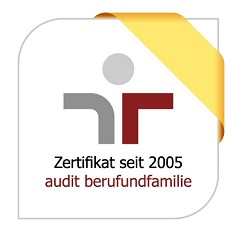Postdoc for the Division of Personalized Immunotherapies
Reference number: 2025-0293
- Mainz
- Full-time
- HI-TRON Mainz - Personalized Immunotherapies

The German Cancer Research Center (DKFZ) is one of Europe’s largest cancer research centers. “Research for a life without cancer" is the mission of our world-class scientists and all our team members.
The DKFZ is a place where the brightest minds pursue bold ideas and seek answers to pioneering scientific questions through collaboration, innovation, and exploration across many disciplines. We provide a dynamic environment which empowers excellence with state-of-the-art technologies, cutting edge infrastructure, and a global scientific network.
Contribute your knowledge, vision, and dedication to create a space where scientific discovery in cancer research is transformed into benefits for human health.
The Helmholtz Institute HI-TRON is a collaboration of the German Cancer Research Center with the Research Institute for Translational Oncology at the University Medical Center of the Johannes Gutenberg University Mainz (TRON gGmbH), the University Medical Center Mainz and the Johannes Gutenberg University Mainz. The goal of the partnership is to develop effective immunotherapies and to identify novel biomarkers for assessing the effectiveness of treatment.
To strengthen the HI-TRON team in Mainz, we are seeking for the next possible date a skilled and motivated
The Division of Personalized Immunotherapy (headed by Prof. Dr. Özlem Türeci) at HI-TRON Mainz is looking for an individual with a strong background in oncoimmunology and a passion for developing innovative immunotherapies. The successful candidate will be instrumental in advancing fundamental knowledge and creating novel technologies to improve responsiveness to immune checkpoint inhibitors via cell-specific mRNA delivery.
Your Tasks
Project Summary:
Exhausted CD8⁺ T cells in human tumors represent a highly heterogeneous population composed of multiple functional and developmental subsets. Recent studies identified a precursor/progenitor exhausted T cell subset characterized by TCF-1 expression, proliferative potential, and multilineage differentiation capacity. These cells serve as the critical reservoir that gives rise to intermediate and terminally exhausted subsets, which, although cytotoxic, display high inhibitory receptor expression and limited persistence.
Notably, clinical responses to anti–PD-1 immune checkpoint blockade correlate strongly with the presence and expansion of these precursor/progenitor exhausted CD8⁺ T cells. However, a substantial proportion of patients fail to respond despite tumor-infiltrating CD8⁺ T cells, suggesting that the composition of exhausted T cell subsets — not merely their presence — is a determinant of therapy success.
This project aims to expand precursor/progenitor exhausted CD8⁺ T cells through enforced expression of specific transcription factors using targeted mRNA delivery technologies, with the vision of enhancing responsiveness to immune checkpoint inhibitors.
Key Responsibilities:
- Design, execute, and optimize functional and phenotypic assays on human T cells (in vitro and ex vivo)
- Engineer T cells using mRNA delivery platforms via lipid nanoparticles
- Characterize T cell subsets using multiparametric flow cytometry and single-cell omics
- Evaluate T cell stemness, exhaustion signatures, proliferative potential, and effector function (killing assays, cytokine profiling, transcriptomics)
- Perform murine in vivo studies, including tumor implantation, treatment studies, tissue processing, and extensive immune profiling
- Collaborate within a multidisciplinary team, present data internally and externally, and contribute to manuscripts and grant proposals
- Maintain accurate laboratory documentation and adhere to biosafety and ethical standards
- Mentor junior scientists
Your Profile
Required Qualifications:
- Master's degree (M.Sc.) and PhD in immunology, cancer biology, molecular biology, biomedical sciences, or a related discipline
- Proven expertise in T cell biology, including activation, exhaustion, or immunotherapy
- Hands-on experience with primary immune cell culture and flow cytometry-based phenotyping
- Experience with mouse models, including handling, injections, harvesting tissues, and processing tumor/immune samples
- FELASA or equivalent animal experimentation certification
- Strong troubleshooting ability, scientific rigor, and motivation for translational immunology
Preferred/Desirable Skills:
- Experience with mRNA expression systems, gene delivery, or viral/non-viral engineering
- Familiarity with single-cell (scRNA-seq/ATAC) or spatial technologies
- Background in tumor models, checkpoint therapy, or T cell differentiation
- Excellent communication and teamwork skills
Please submit:
- Cover letter describing motivation and relevant expertise
- CV with publication list
- Contact details of 2–3 referees
We Offer
Excellent framework conditions: state-of-the-art equipment and opportunities for international networking at the highest level
Remuneration according to TV-L incl. occupational pension plan and capital-forming payments
30 days of vacation per year
Flexible working hours
Possibility of part-time work
Family-friendly working environment
Sustainable travel to work: subsidized Germany job ticket
Our Corporate Health Management Program offers a holistic approach to your well-being
Develop your full potential: access to the DKFZ International Postdoc Program and DKFZ Career Service with targeted offers for your personal development to further develop your talents
Are you interested?
Then become part of the DKFZ and join us in contributing to a life without cancer!
Dr. Ibrahim Murathan Sektioglu
Phone: +49 (0)6131/179816
Applications by e-mail cannot be accepted.
We are convinced that an innovative research and working environment thrives on the diversity of its employees. Therefore, we welcome applications from talented people, regardless of gender, cultural background, nationality, ethnicity, sexual identity, physical ability, religion and age. People with severe disabilities are given preference if they have the same aptitude.

